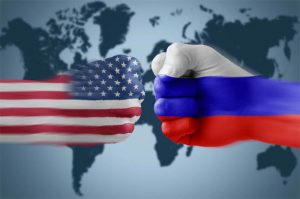Newspaper Article 23/01/2018
Undoubtedly, Syria is one of the most convoluted conflicts of the contemporary world, which has protracted for seven years. However, amidst the peace talks and proclamations by the various parties involved in Syria regarding the beginning of a new phase, there is a need to discern if Russia has outflanked the US?
While the Russian ground presence and her support of Bashar al-Assad is one of the undeniable achievements of Russia, but the Russian allies appear to have gained more than the estimates. Likewise, the peace talk spearheaded by Russia in Sochi and Astana is another aspect which clearly provides Russia with advantages over the US. First, it has contributed to improving the global perception of the Russian standing in the global affairs. Second, it provides Russia with the power to chalk out the future of Syria without the assistance of the US. This is not to say that the US will not have a role in the Syrian peace process, however, American clout relative to Russia and her allies has diminished.
The US role under Obama administration remained limited in Syria, as it was believed that Putin’s decision to get into Syria to support the Assad forces would end in a disaster. However, with the defeat of ISIL, it is becoming clearer that Russian influence in Syria has increased to a large extent. Similarly, the Trump administration may claim to play a role in the peace process, but their ground presence and negligible role in the peace process, especially as compared to Turkey and Iran cannot be overlooked.
The Astana talks appear to be devoid of the American stance, as it is sponsored by Russia. Turkey and Iran are two of the most prominent actors of the Russian-led peace process in Astana and Sochi. More so, the new rounds of Syrian peace talk are expected to resume in January 2018. Though the Syrian opposition has not explicitly confirmed participation, but its significance has been recognized by opposition representatives and the UN in the official statements.
Interestingly, Iran and Russia are on the same page when it comes to backing the Bashar al-Assad, however, the Turkish stance differs, as it supports the non-Kurdish forces in addition to the removal of Assad. The UN envoy Staffan de Mistura has also announced a fresh round of talks which is expected to bolster the peace process mandated by the United Nations Organization (UNO). Simply put, the progress of these parallel talks is hard to track, as the major actors have not been able to reach a concrete agreement yet.
The Russian announcement of the partial troop withdrawal is another factor which is seen as the beginning of another phase in Syria. For example, some analysts read it as Russian signaling their victory and interest for determining the future of Syria in terms of finding a power-sharing formula among the important stakeholders. Even though the US-backed Syrian democratic forces (SDF) have gained the control of some of the territory in the fight against ISIL, however, the preservation of control in the long-term is something which is seen dubiously by the analysts.
Despite the official statements underlining the participation of all factions in the January peace talks, the leader of the Syrian opposition group, Ahmed Toma, has not confirmed the participation in the Sochi conference. In this context, the UN-led initiative is constantly being challenged with the emphasis of the Turkey and Iran on the Russian peace talks held in Astana and Sochi. Therefore, it remains to be seen if the two different tracks of the peace talks will be able to accomplish the desired results in addition to gaining the attention of the all the major parties involved in the Syrian conflict?
The ambiguous US policy in Syria is seen as the main cause of the weak American presence in the Syrian dynamics. For instance, the US support seems to be restricted to defeating ISIL. Similarly, the presence of different stakeholders for competing interests is another factor which calls for a focused strategy. However, if one compares the Russian strategy with the American, it clearly reflects the difference in focus and means applied to achieve the desired interests. For example, the strategy of Moscow appears to rely more on catering to the seemingly opposing interests of all the actors involved in Syria in addition to bringing change in the status quo. On the other hand, the American strategy is expected to focus on the diplomatic efforts more.
In terms of backing Assad regime, maintaining formidable ground forces and securing the main areas of interest, Russia has clearly outflanked the US. Similarly, the progress in the peace process is one of the most pertinent aspects which lack the US presence. Moreover, the faltering Geneva talks are another evidence of the weak role the US and Western actors are likely to play in shaping the Syrian future.
Article originally published in Regional Rapport on January 04, 2018.
Disclaimer: Views expressed are of the writer and are not necessarily reflective of IPRI policy.


